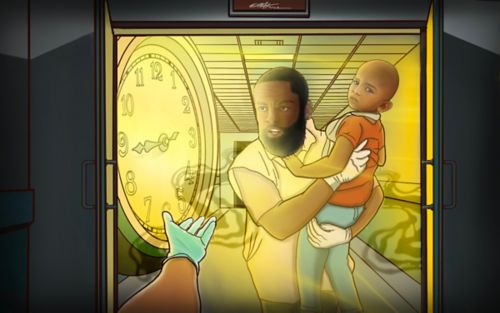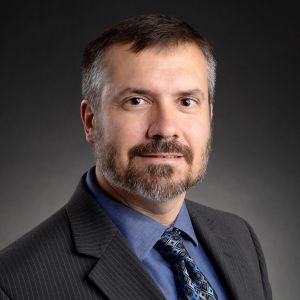St. Jude Family of Websites
Explore our cutting edge research, world-class patient care, career opportunities and more.
St. Jude Children's Research Hospital Home

- Fundraising
St. Jude Family of Websites
Explore our cutting edge research, world-class patient care, career opportunities and more.
St. Jude Children's Research Hospital Home

- Fundraising
In the ‘Golden Hour,’ antibiotics save lives in Latin America

For a child undergoing cancer treatment, a fever (which can be a sign of infection) can have serious consequences without immediate care. Upon arriving at the emergency department, administering antibiotics within the first 60 minutes, the Golden Hour, can be a crucial factor in saving lives. Artwork by Malcolm Houston.
Imagine you are the parent of a child with cancer. While playing at home one day, you realize that your child seems unwell — you decide to take them to the nearest emergency room. In emergency care, minutes matter. It’s especially true for children with cancer who present to an emergency department with a fever. Infections are a major cause for concern in a child undergoing cancer treatment, resulting in complications and even death. However, administering the first dose of antibiotics to that child within the “golden hour,” the first 60 minutes after they arrive in the emergency department, has been shown to prevent sepsis and save lives.
Through St. Jude Global, the Mexico Regional Program has been working to bring Golden Hour programs to hospitals in the region, providing education and support to emergency departments and pediatric-hematology units or services. A pilot quality improvement program brought the Golden Hour to Tijuana in 2016, and an additional pilot using quality improvement methods was run in two sites simultaneously (Culiacán and Guadalajara) in 2018.
Following those projects, from May 2019 to November 2020, the Mexico Regional Program launched the 1st Mexico in Alliance with St. Jude (MAS) Quality Improvement Collaborative for children with cancer. The 1st Golden Hour Collaborative worked with 23 hospitals in the region. It aimed to increase the number of pediatric hematology-oncology patients who presented to the emergency department (or equivalent) with a fever and received the first dose of antibiotics in 60 minutes or less by 50%. Participating institutions exceeded the goal despite the COVID-19 pandemic. The results showed an improvement from 39% to 79% of hospitals using this well-accepted quality indicator.
“The ideal time to [administer] antibiotic therapy for children with cancer is within 60 minutes of arrival to the hospital,” said Paola Friedrich, MD, St. Jude Global Mexico and Central and South America regional programs director. This differs from what is recommended for general pediatric patients, and it differs from what general practitioners have been taught to do for previously healthy children who arrive at the emergency department. In that setting, unless the child is in septic shock, from an antibiotic stewardship standpoint, the recommendation is to wait to start antibiotics until they have established a diagnosis.”
Gaining momentum: the 2nd MAS Collaborative
The positive collective experience of the participants and the results of the 1st Golden Hour Collaborative generated momentum for expanding through a second round. The 2nd MAS Collaborative, Golden Hour: Minutes that Save Lives, ran from November 2021 through May 2023. It followed a scaling strategy, spreading to a total of 85 hospitals across six countries in Latin America. Of those hospitals, 74 are in Mexico. The other 11 centers are in Panama, Peru, Brazil, Haiti and Paraguay. The goal was to achieve greater than 70% compliance with the same quality indicator (percentage of pediatric hematology-oncology patients with fever who receive the first dose of antibiotics in that precious first hour) at a much larger scale.

Participants from the 2nd MAS Collaborative, Golden Hour: Minutes that Save Lives.
The 2nd MAS Golden Hour Collaborative was developed as a collaboration between St. Jude Global, the Institute for Healthcare Improvement (IHI), Casa de la Amistad para Niños con Cancer and MAS, which is a network of more than 50 hospitals in Mexico. It received endorsement from multiple governmental and non-governmental organizations and professional societies, including but not limited to Mexico’s Secretary of Health, the Mexican Institute of Social Security, the Institute for Social Security and Services for State Workers (IMSS), the Gonzalo Rio Arronte Foundation and the Pan American Health Organization.
“How can we coach institutions to navigate these recommendations and implement quality improvement projects that are simultaneously sensitive to evidence in the literature and local considerations?” asked Friedrich. “How do we ensure teams buy in and feel comfortable with these practice improvement efforts? How do we help teams make these projects and the data they generate their own?”
The team found their answers in a specific methodology for improvement projects. The 2nd MAS Golden Hour Collaborative used the methodology Breakthrough Series, IHI’s collaborative model, to achieve breakthrough improvements that bridged the knowledge-to-practice gap. To build capacity and nurture empowerment, during both rounds, the St. Jude Global Mexico Regional Program and IHI delivered training in quality improvement methods, tools and skills through virtual and in-person workshops called “Learning Sessions.” During these events, each hospital evaluates their progress and shares their results with other participating hospitals. Three virtual and three in-person sessions were held during the two Golden Hour Collaboratives.
In the most recent Collaborative, all 85 teams met in person in August of 2022 for the second Learning Session. The event was massive, and the momentum and enthusiasm it generated was truly unprecedented. By May of 2023, more than 6,000 instances of fever had been documented, and the number of pediatric hematology-oncology patients who received antibiotics in the first 60 minutes increased from 47% to 79%. In addition, the proportion of pediatric hematology-oncology patients who developed sepsis after arrival at the emergency room decreased from 16% to 6%. These results exceeded the participants’ and stakeholders’ expectations.
The 2nd MAS Golden Hour Collaborative officially finished in May 2023. Since then, the teams have continued working on sustainability and institutionalization. They are engaging in new collaborative formats and sharing data and learnings quarterly.
A golden future: Making improvements that last
The clinical improvements were not the only positive impact of the 2nd MAS Golden Hour Collaborative. Each institution gained important knowledge that enables them to conduct quality improvement projects, effectively collect and plot their own data and meaningfully interpret that information. A team of 11 St. Jude- and IHI-trained quality improvement coaches based in Mexico, along with seven from IHI, provided monthly sessions to help the teams apply skills gained in quality improvement and accelerate a continuous improvement culture. The coaches followed the progress as each institution tracked and shared data. As training occurs, the coaches track and evaluate the institution’s progress in real-time.
The 2nd MAS Golden Hour collaborative has created a network of institutions across Latin America with the training to produce their own quality improvement projects, even in other services beyond pediatric hematology-oncology care. This is how the whole network has revolutionized the health system, transformed children’s dreams and empowered the community.
“We know the Golden Hour works,” Friedrich said. “Now we have robust data to show it works in diverse real-world settings across Latin America and that, working together, health care teams and institutions can reduce preventable sources of morbidity and mortality, reduce unwanted variations in care, anchor service delivery on the patient and their experience and improve the overall quality of care being delivered.”
“More than 6,000 documented fever events means more than 6,000 opportunities to save lives,” she said.






